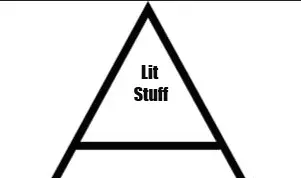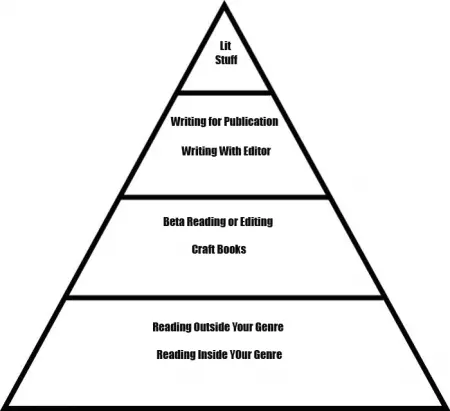Writing professionally can be really hard, but dieting and losing weight is so much harder. I’ve done a lot of writing and editing in the last five years, but the trade off has been gaining 40 pounds, and none of it muscle. I tried exercising, portion control, but none of it worked. If I managed to lose a few pounds, I felt miserable, like I was starving. I’d last two weeks at most, and then give in to overeating. It’s been incredibly frustrating. After seeing some unflattering pictures of myself from AWP this February, I returned home and decided that I needed to find a diet that worked for me, not just in the present but also for the long haul.
I researched online about eating healthy and saw the famous food pyramid by the USDA. I had been following most of its guidelines in my eating, but when I clicked on one of the food pyramid links, I saw a site claiming that the food pyramid was total bullshit. Intrigued, I read on. I learned that eating carbs and high glucose foods was leaving me unsatisfied because they were causing my insulin to shoot up, making me feel like I was hungry. I needed way more fats and way less carbs. Since I reversed my diet and turned the traditional food pyramid upside down, I have lost close to 20 pounds and don’t suffer from that miserable feeling of false starvation.
This weight loss made me wonder if writers are getting a lot of bullshit and even unhealthy writing advice from the literary establishment, just as people were getting bad advice from the nutritionists who designed the food pyramid. Is focusing a majority of your time on being the best literary citizen the equivalent to eating a lot of needless carbs? We are told to read and write, but what kind of reading and writing? That statement can sound as trivial and uninformative as ‘eat healthy and exercise.’ It hit me that young writers like myself could use a food pyramid for craft. So here it goes!
The Bottom: Fats & Fuel & Lots of Reading!
It seems so obvious, but I have met writers in all career stages that don’t actually read that much. They must be really talented, because I read a ton just so my writing is readable. I know the goal we are sold on is to be a great writer, but I wish we focused more on being excellent readers. If I have done anything right it is that I have tried to read as extensively as possible. Yes, I read for enjoyment, but I also look for what works and what doesn't in every book I read. I focus on the language, the plot, the dialogue, the pacing, the atmosphere, and most importantly, the character. And I want as many interesting characters as I can find. Like a healthy diet, I try to mix it up and read genre fiction, YA, even romance and erotica (shout out to Tiffany Reisz, she lays it down), literary fiction, non-fiction, and yes, even poetry. I try to keep learning as a reader and not think of any one genre as the end-all be-all.
When you start eating healthy, you can actually taste the subtle flavors in your food. You can tell when something has been highly processed or isn’t fresh. When you read extensively you can actually trust your opinion if a book is good or bad. I’ve seen books get so much hype and a lot of very smart people buy into the greatness of the book, and even give it awards. I’ll go read it and the work is ‘meh’ or just plain bad. Yes, writing can be subjective, but after reading a lot of different types of books I can see a book’s structural flaws as well as appreciate their strengths. The biggest reward is I can trust my own tastes, and this helps tremendously when I have to revise my work.
Mid Bottom: More Reading, Fiber & Nutrients
I’m pro craft book. I know a lot of people make fun of them but I have gotten something out of every single craft book I’ve read. A craft book usually has a lame title, playing on an even lamer sounding writing pun, and focuses on storytelling or syntax and style. The titles may make writers roll their eyes, but craft books keep me regular, so to speak. I see the page better because of them and I can have fun breaking rules because I know almost all of them.
The final way to read well is to be a beta reader or an editor. I’m an editor and publisher and I can tell you, looking at open submissions will change the way you write. If you aren't an editor or a publisher, a great way to see a book through different lenses is to be a beta reader. Your job is to point out what isn't working and you will start seeing those things in your own writing. This is an invaluable way to learn how to revise and edit.
High Middle: Writing & Protein
The most toxic idea is that writing is a solitary act. That there is some genius locked away and they are going to produce a masterpiece all by themselves. Bullshit. Total bullshit. Great writing is a two-person deal, and that comes from working with an editor. An editor is not just someone who copyedits, they actually give you constructive suggestions on how to make your story better. A mentor can do that too. Someone who knows more than you can show you how to improve your work. Writing and showing your work to someone you can trust, who knows more than you, and rewriting after taking their suggestions is going to make you publishable.
Writing something to be published, that you will get paid for, is the key to consistently writing well. Journaling and blogging are great for practice, but writing and revising to submit for cash money is the only way to build those writing muscles up. I've got nothing against self-publishing and have had success with it, but writing something and just throwing it up on Kindle with a copyedit and a shitty cover doesn’t really count. Put your manuscript through some beta readers and a good editor, then go right head and self-publish and make some money if you can. I know we have an idea that writing for money debases the art form, but it is probably the healthiest way to approach writing and to improve as a writer. When you are playing for pay, you’re going to become a stronger writer.

The Top: Good Carbs, Cheat Foods, Literary Community & Social Media
Good carbs and the occasional cheat food (food that is shitty for you, but tastes good) can be a great addition when used sparingly and enjoyed fully. This is basically literary community stuff online. The problem is this stuff has become 80% of the literary diet. This involves seeing what new books are out, congratulating writers and friends on new books, going to readings, writing reviews, doing podcasts, fucking around on social media, and even engaging in literary gossip, like which small press writer has gone off the deep end and started acting very ... strange.
There is the idea of being a ‘good literary citizen,’ which sounds like something an MFA Administrator made up. For the most part it is a good thing to be: help other writers out, be encouraging, give back to new writers, and write reviews. The problem with this is that we are doing things that aren’t genuine and authentic to ourselves. Life is too short to promote books you don’t like, to go to readings you find boring, and review books you think suck and are bullshit. My advice is, interact with writers you enjoy, promote and review books you really love, and go to readings you actually enjoy. It’s a healthier way to live and a more nourishing way to embrace the writing life.
Disagree? Share your literary diet in the comments. Good luck, and healthy writing!

About the author
Christoph Paul is the Managing Editor and owner of CLASH Books, who have published over 60 books and have been covered by NPR, Poets & Writers, Rolling Stone, Believer Magazine, Oprah Magazine, The Observer, Fangoria, and Publisher's Weekly. The press has had books translated into Spanish, French, and Italian. He has been editing books in almost every genre for over a decade. As an author, he won a humor award and had viral cult success under a pen name. He is the lead singer and bass player of the rock band The Dionysus Effect, who have received positive reviews in Loudwire, EARMILK, and Red Rock Magazine. He sometimes writes songs about the books he publishes because even artists are inspired by their day jobs. Follow him on Twitter @christophpaul_ @clashbooks @dionysuseffect.









